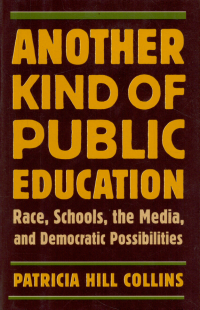
Ebook: Another Kind of Public Education: Race, Schools, the Media, and Democratic Possibilities
Author: Patricia Hill Collins
- Series: A Simmons College/Beacon Press race education and democracy series book
- Year: 2009
- Publisher: Beacon Press
- Language: English
- pdf
Sociologist Patricia Hill Collins opens this brilliant new book on race and education by describing how in her senior year at the Philadelphia High School for girls, near the end of a public school education that “had almost silenced me,” she was invited to deliver a graduation address on the meaning of the American flag. She refused to deliver the censored version her teacher demanded, and someone else took her place on stage.
Another Kind of Public Education spins the threads of that story—the way education, race, and democracy are intertwined; the way racism and resistance work through a variety of unspoken means; what schools do to limit or to open up possibilities—into a call for “another kind of public education,” one that helps us “envision new democratic possibilities.”
Collins begins, in a tour de force of social analysis with practical implications, by demystifying what she calls “color-blind racism as a system of power.” She argues that the generation coming of age at the turn of the twenty-first century—in a post-civil-rights society that publicly claims to be “color-blind”—needs a new language for analyzing the new “color-blind racism” of contemporary society that has stymied efforts to live up to the promise of American democracy.
She shows us how racism as a system of power works in four distinct yet intertwined domains—structural, disciplinary, cultural, and interpersonal. Drawing examples from schools, politics, pop culture, personal experience, and more, she demonstrates in eye-opening ways how racial inequality is manufactured and reinforced, even as we publicly espouse an ideology of color-blind fairness.
And she points, crucially, to what we can do about it. Noting that everyone is situated differently in the complex domains of power, she urges us to “think expansively about resistance,” to figure out in which domain we can have the most effect in resisting racism as a system of power, and how. She also discusses classrooms around the country, teaching as a subversive activity, “cultivating countersurveillance,” and the power of storytelling and media.
Blending entertaining storytelling, social theory, and practical suggestions for changing institutions, including schools, Another Kind of Public Education is both a call for change and a reminder that public education—in every sense—is at the heart of American democratic possibilities.
Another Kind of Public Education spins the threads of that story—the way education, race, and democracy are intertwined; the way racism and resistance work through a variety of unspoken means; what schools do to limit or to open up possibilities—into a call for “another kind of public education,” one that helps us “envision new democratic possibilities.”
Collins begins, in a tour de force of social analysis with practical implications, by demystifying what she calls “color-blind racism as a system of power.” She argues that the generation coming of age at the turn of the twenty-first century—in a post-civil-rights society that publicly claims to be “color-blind”—needs a new language for analyzing the new “color-blind racism” of contemporary society that has stymied efforts to live up to the promise of American democracy.
She shows us how racism as a system of power works in four distinct yet intertwined domains—structural, disciplinary, cultural, and interpersonal. Drawing examples from schools, politics, pop culture, personal experience, and more, she demonstrates in eye-opening ways how racial inequality is manufactured and reinforced, even as we publicly espouse an ideology of color-blind fairness.
And she points, crucially, to what we can do about it. Noting that everyone is situated differently in the complex domains of power, she urges us to “think expansively about resistance,” to figure out in which domain we can have the most effect in resisting racism as a system of power, and how. She also discusses classrooms around the country, teaching as a subversive activity, “cultivating countersurveillance,” and the power of storytelling and media.
Blending entertaining storytelling, social theory, and practical suggestions for changing institutions, including schools, Another Kind of Public Education is both a call for change and a reminder that public education—in every sense—is at the heart of American democratic possibilities.
Download the book Another Kind of Public Education: Race, Schools, the Media, and Democratic Possibilities for free or read online
Continue reading on any device:

Last viewed books
Related books
{related-news}
Comments (0)